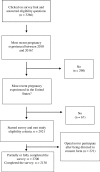The Giving Voice to Mothers study: inequity and mistreatment during pregnancy and childbirth in the United States
- PMID: 31182118
- PMCID: PMC6558766
- DOI: 10.1186/s12978-019-0729-2
The Giving Voice to Mothers study: inequity and mistreatment during pregnancy and childbirth in the United States
Abstract
Background: Recently WHO researchers described seven dimensions of mistreatment in maternity care that have adverse impacts on quality and safety. Applying the WHO framework for quality care, service users partnered with NGOs, clinicians, and researchers, to design and conduct the Giving Voice to Mothers (GVtM)-US study.
Methods: Our multi-stakeholder team distributed an online cross-sectional survey to capture lived experiences of maternity care in diverse populations. Patient-designed items included indicators of verbal and physical abuse, autonomy, discrimination, failure to meet professional standards of care, poor rapport with providers, and poor conditions in the health system. We quantified the prevalence of mistreatment by race, socio-demographics, mode of birth, place of birth, and context of care, and describe the intersectional relationships between these variables.
Results: Of eligible participants (n = 2700), 2138 completed all sections of the survey. One in six women (17.3%) reported experiencing one or more types of mistreatment such as: loss of autonomy; being shouted at, scolded, or threatened; and being ignored, refused, or receiving no response to requests for help. Context of care (e.g. mode of birth; transfer; difference of opinion) correlated with increased reports of mistreatment. Experiences of mistreatment differed significantly by place of birth: 5.1% of women who gave birth at home versus 28.1% of women who gave birth at the hospital. Factors associated with a lower likelihood of mistreatment included having a vaginal birth, a community birth, a midwife, and being white, multiparous, and older than 30 years. Rates of mistreatment for women of colour were consistently higher even when examining interactions between race and other maternal characteristics. For example, 27.2% of women of colour with low SES reported any mistreatment versus 18.7% of white women with low SES. Regardless of maternal race, having a partner who was Black also increased reported mistreatment.
Conclusion: This is the first study to use indicators developed by service users to describe mistreatment in childbirth in the US. Our findings suggest that mistreatment is experienced more frequently by women of colour, when birth occurs in hospitals, and among those with social, economic or health challenges. Mistreatment is exacerbated by unexpected obstetric interventions, and by patient-provider disagreements.
Keywords: Abuse; Childbirth; Disrespect; Health equity; Home birth; Hospital birth; Midwifery; Mistreatment; Participatory research; Pregnancy; Quality measure; Race; Respectful maternity care.
Conflict of interest statement
The authors declare that they have no competing interests.
Figures
References
-
- Miller Suellen, Abalos Edgardo, Chamillard Monica, Ciapponi Agustin, Colaci Daniela, Comandé Daniel, Diaz Virginia, Geller Stacie, Hanson Claudia, Langer Ana, Manuelli Victoria, Millar Kathryn, Morhason-Bello Imran, Castro Cynthia Pileggi, Pileggi Vicky Nogueira, Robinson Nuriya, Skaer Michelle, Souza João Paulo, Vogel Joshua P, Althabe Fernando. Beyond too little, too late and too much, too soon: a pathway towards evidence-based, respectful maternity care worldwide. The Lancet. 2016;388(10056):2176–2192. doi: 10.1016/S0140-6736(16)31472-6. - DOI - PubMed
-
- World Health Organization (WHO). Standards for improving quality of maternal and newborn Care in Health Facilities [Internet]. 2016. Available from: http://www.who.int/maternal_child_adolescent/documents/improving-materna...
-
- The Partnership for Maternal Newborn & child health. Professional associations affirm commitment to improving quality of maternal and newborn health care [Internet]. FIGO news, WHO news. 2017. Available from: http://www.who.int/pmnch/media/events/2017/lilongwe/en/index1.html



